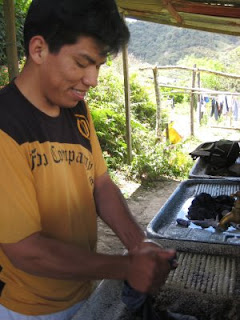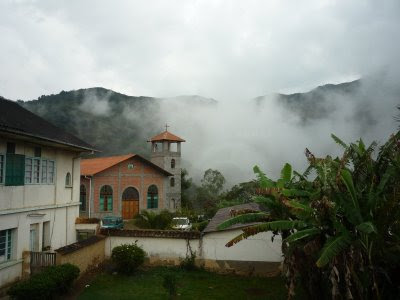

Pronunciation: \oo-chu-ma-chee\; Function: noun; Etymology: Aymaran; 1: a place that makes rain, 2: the grandiose mountain and cloud forest region that towers over the uac-cp


 Eight-year-old Fatima predicts she will be 17 when she graduates from high school.
Eight-year-old Fatima predicts she will be 17 when she graduates from high school.
 Mondays are a popular day for doing laundry. Thankfully today is a beautiful day and anything washed this morning should be dry by early evening.
Mondays are a popular day for doing laundry. Thankfully today is a beautiful day and anything washed this morning should be dry by early evening.






 "Sarah de la UAC!" is generally how I'm greeted by Oscar, jefe of Totai, when I show up unannounced to buy my ticket to Coroico.
"Sarah de la UAC!" is generally how I'm greeted by Oscar, jefe of Totai, when I show up unannounced to buy my ticket to Coroico.  Ann Leahy, Sue Wheeler, and Joel Mugge shared a special meal with memebers of the College's student body council
Ann Leahy, Sue Wheeler, and Joel Mugge shared a special meal with memebers of the College's student body council



Now, Judit explained to me, she´s able to lightly water the small budding spinach plants in her garden plot. "I couldn´t afford to buy any type of adapter," she told me. "But Ing. Desiderio (a UAC-CP professor) gave me this idea and it´s worked really well!"
I can´t help but believe that the average person here is a bit more creative. It´s not to say that Bolivians are more creative people, but when you are financially limited and live and work in an environment that lacks many modern conveniences, it´s necessary to think of (inexpensive) alternatives. Judit´s hose adaptor is one of many examples here of creative and effective solutions.
UAC-CP volunteers also find themselves coming up with ways to adapt certain comforts from home to life here in the countryside. One of my favorite inventions in the volunteer house is the toaster that John Carr created during his visit to the UAC in 2004. Cutting a large tin can in half and poking several holes in the bottom, he welded pieces of wire across the opening and...WOILA!...we have a toaster! Again, it´s a simple design--it merely keeps the bread elevated above the gas flame--but without it, making toast would be a bit more of a chore. I think of John every time I eat toast for breakfast.
 The toaster in the volunteer house (it looks much less intimidating in person).
The toaster in the volunteer house (it looks much less intimidating in person).